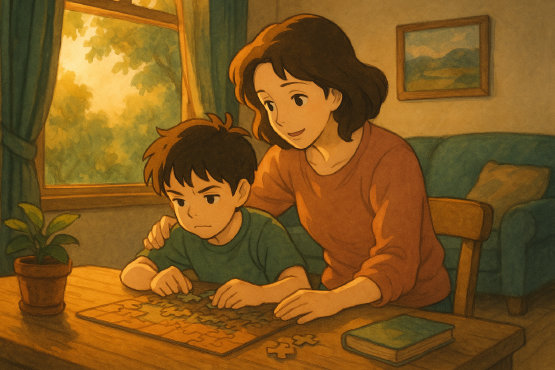Gaming addiction, the temptation of dopamine and the miracle of slow achievement
Causes of Game Addiction
The reason children get addicted to games is not simply because they are fun. Beneath that lies an emotional emptiness and physiological mechanisms created by modern society. At the center of this is an invisible chain known as 'dopamine addiction.' Dopamine is a neurotransmitter released when the brain experiences pleasure. Games are specifically designed to constantly stimulate this dopamine. Every time a mission is completed, a level is gained, or an item is acquired—the brain provides instant satisfaction and thrilling excitement as a reward. However, the problem is that this pleasure is too immediate and intense. Over time, the child's brain becomes unresponsive to ordinary experiences or efforts in daily life. Achievements in reality are too slow, complicated, and uncertain. This is what dopamine addiction is about. In simple terms, it means becoming a 'brain that cannot wait.'
The necessity of slow achievement
In this situation, simply stopping the game will not lead to a solution for parents. Instead, a deeper path to recovery is needed, which is the training of slow achievement. This is a journey where the child endures and completes small processes in life that do not provide rewards overnight, allowing them to discover their own value within. For example, focusing on fitting a puzzle piece, the waiting time while growing a plant, practicing repeatedly to learn a music score, or the sense of accomplishment from finishing a book—these experiences are all healing processes that gradually restore the child's brain to a 'brain that can wait.' Initially, it may feel boring and uncomfortable. However, when parents stay by their side, encouraging and rejoicing in the process as the child perseveres, the child learns that the world does not operate solely on immediate rewards. They grow into individuals who can wait for their own lives.
Role of Parents
This slow achievement training is also a challenge for parents. Rather than demanding immediate changes, what is needed is an attitude of believing in the unseen growth. When a child is struggling, instead of doing it for them, saying, 'You can do it till the end, I believe in you,' shows love. It is support, not discipline, and solidarity, not control. The deep satisfaction that comes from slow achievement is what truly empowers a child to grow into a real adult, more than the fleeting pleasure that dopamine provides. And what makes this possible is the warm patience and consistent attention of the parents.
The essence of gaming addiction
We must remember that the shadow of gaming addiction we face today is not just a matter of technology. It is also an opportunity to guide children who have lost their way between 'speed' and 'depth' back to the direction of life. The path where a child can blossom most authentically is hidden in slow achievements rather than rapid success. Ultimately, love is about waiting. It is the courage to walk together day by day, to genuinely celebrate small accomplishments, and to cry together in difficult moments. When that love accumulates, the child regains the strength to live in reality. And we all learn together how to live as human beings beyond technology.

Post a Comment